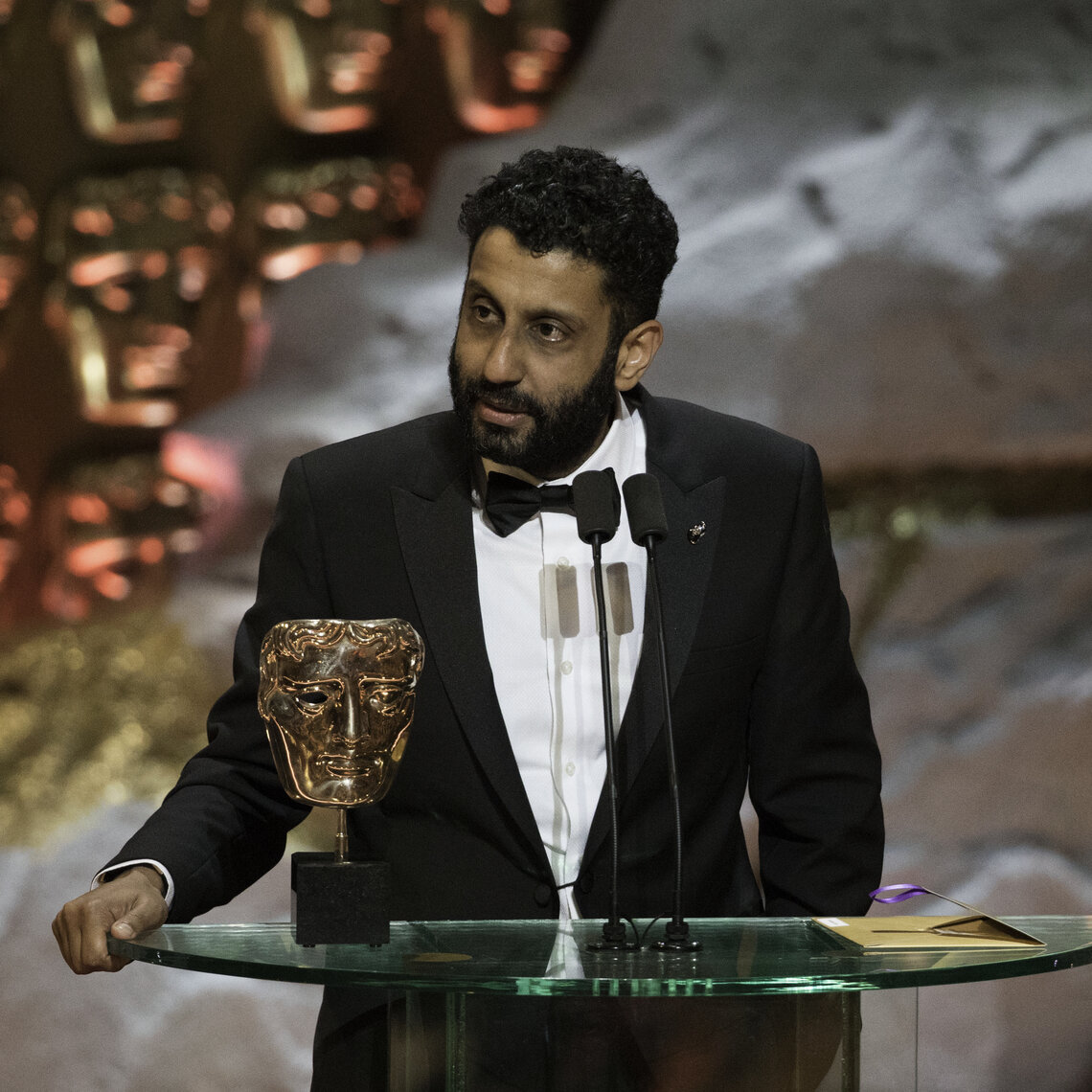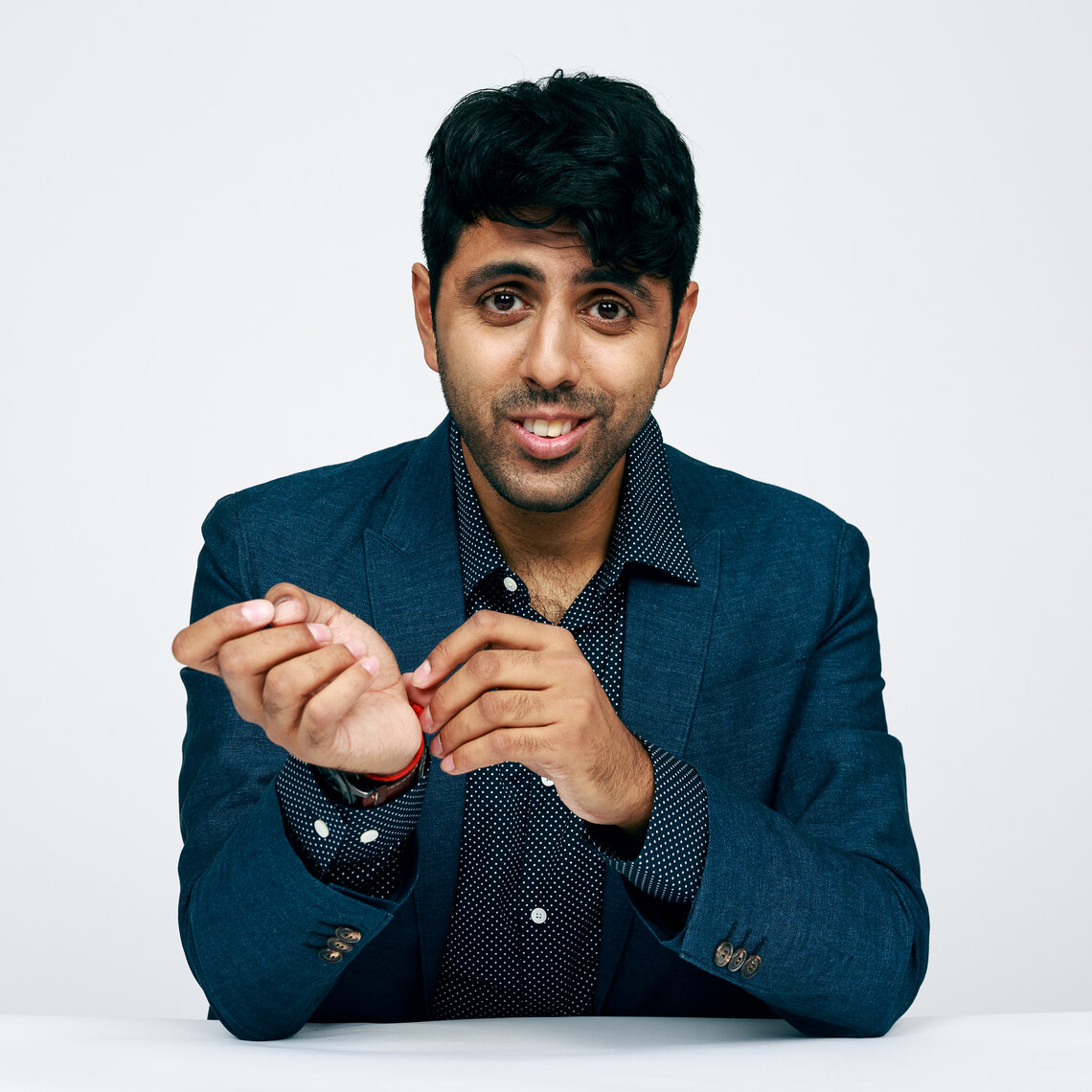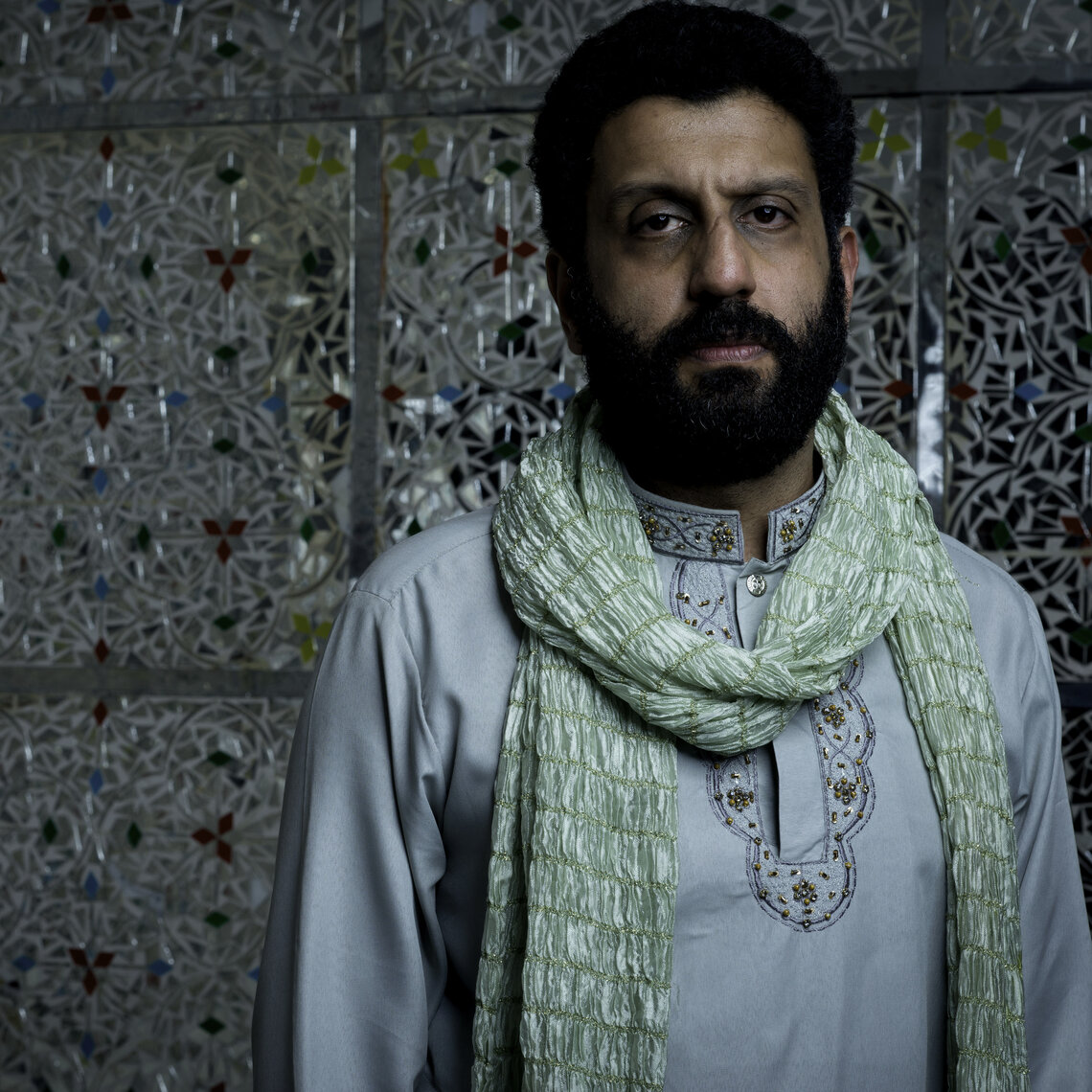Writer, BAFTA Breakthrough Brit and BAFTA nominee Vinay Patel sits down for a chat with BAFTA winner Adeel Akhtar. Words by Vinay Patel.
Nothing better demonstrates the nature of Adeel Akhtar as both an actor and an individual as my encounter with him on the first day of rehearsals for Murdered By My Father. He turned up in sunglasses on a day that definitely didn’t need them and alarm bells immediately began ringing in my head. Those hoary clichés of aloof actors I knew could be true but surely not Adeel? A man who I’d first fallen for in the brilliant Four Lions who cemented that affection with his quietly excoriating turn as Wilson Wilson in Dennis Kelly’s Utopia. I prepared myself for that adoration to evaporate before the surly, sunglasssed reality.
And then Adeel removed those glasses and sheepishly apologised for them. “These are the only prescription pair I have. I lost my normal ones last night at a party. I dove into a ball pit and they broke.” I’d been wrong in my hasty judgements - this was exactly the sort of person I want to work with.
“It’s that face” I think to myself as I spot Adeel across the room, waiting for our interview. A gift of a face which in a slight can flick and turn from tender to terrifying. It’s this which makes him such a compelling screen presence. Which expression will this visual box of tricks serve up next? You can never be sure.
Writers imagine actors as they write. They imagine the performance, a multitude of emotions played out at the same time: happy-nervous, angry-sad, mellifluous, layered expressions of your obviously brilliant works, take after take.
Of course, this expectation of an actor to play multiple things at once is soon knocked out of you. You learn to give actors a single actionable point to play, whilst secretly hoping that the actor will manage those multitudes anyway. Adeel manages just that.
There’s a scene in Murdered By My Father where he is trying to impose his authority on his daughter, Salma. Such authority is an unnatural fit for his character. Writing it, I hoped it would be a strong enough command that we’d buy Salma’s acceptance whilst also giving us enough weakness so that it was clear that this was an insecure man playing big, and doing this was costing him a part of himself. You can’t write that. You can only hope. In this scene, Adeel straddles that line perfectly. I don’t think it’s an exaggeration to say that the film rests on his ability to maintain that tension throughout.
“It’s that face” I think to myself as I spot Adeel across the room, waiting for our interview. A gift of a face which in a slight can flick and turn from tender to terrifying. It’s this which makes him such a compelling screen presence. Which expression will this visual box of tricks serve up next? You can never be sure. Luckily, he seems happy to see me.
 BAFTA/GUY LEVYAdeel Akhtar accepts his BAFTA
BAFTA/GUY LEVYAdeel Akhtar accepts his BAFTA
 BAFTA/Charlie CliftVinay Patel
BAFTA/Charlie CliftVinay Patel
I admit I was worried. We last saw each other at the Virgin TV British Academy Television Awards, where a tweet I’d sent in giddy excitement at his win for Best Actor picked up more traction than I expected. You see, the catalyst in my creative fire is the creation of roles. They are powerful cultural artefacts. Roles outlive the writer, they outlive the actor. If they’re good enough on stage, everyone wants to play it. If they're good enough on television, no-one wants to take the part up ever again. Culture casts shadows that we ultimately have not much control over, but we strive to also bring a little light. When it comes to broadening the pool of respected talent in this country, bringing that light, acclaim matters. So I was thrilled to realise that Adeel was the first non-white actor to win this award. I was less thrilled when I realised it seemed to have become the dominant news story about it.
First non-white fella to win a #BAFTA TV award for Best Actor? This guy. (Not me, obvs) pic.twitter.com/KeaKahaufG
— Vinay Patel (@VinayPatel) May 14, 2017
 BBC/Des WillieAdeel in Murdered by My Father
BBC/Des WillieAdeel in Murdered by My Father
He reads me back a text message I’d sent him in the aftermath, apologising for framing his personal achievement so concretely in a political frame that might not be one he cares to engage with. It’s an odd moment, he acknowledges. The sort of moment that you feel like you want to celebrate it and yet you don’t feel like it should’ve had to have been something you’d celebrate. I tell Adeel that I know a younger version of myself and probably of him would’ve loved to have seen this happen as we were coming up. He agrees. But do we meaningfully reach beyond that step? He speaks lovingly of seeing Mark Rylance play Rooster Byron in Jez Butterworth’s Jerusalem. That’s the sort of parts we should both strive to make exist. The success of Murdered By My Father makes it more possible.
Success, however, especially with a potentially contentious piece of drama, comes with responsibility. We talk about the ways this falls differently for each of us. Adeel suggests that, as an actor, it’s his job to imbue his character with all truth that he can, whereas the writer has a greater burden. You’re more at fault for misrepresentation and are expected to have more of the answers. That’s certainly true, but as the writer you can hide yourself away from attention if you so wish. The actor, the public face of the project, has no choice. It’s their face that takes it out into the world and is the front line for both praise and scorn.
Adeel, I’m sure encounters the former more than the latter. I tell him about how, before the film came out, a woman on Twitter held me to account - she loved Adeel and would not countenance me giving him a terrible part. That’s not an unusual response either. It’s genuinely hard to imagine someone hating Adeel. Even when he asks difficult questions, he has the endearing quality of prefacing them with an apologetic “I’m going to be an arsehole here but…”. There’s an inviting calmness and curiosity to him that makes you immediately tired of the bigness that so many in the arts project (myself included).
These qualities are reflected in how he approached his character in our film, but in that case it wasn’t natural, it was technique. We consider our different approaches to our roles in Murdered By My Father. It was a process that ate me up, that dominated my life so fully to the extent that it made me reconsider taking on this sort of work in the future. Honour violence is a topic that - rightly - demands you invest yourself fully but so easily can overwhelm you to detrimental effect. How do you find a way through?
Adeel considers this. “When I was younger, I’d feel like I’d have to give you the version where I show you everything I can do in thirty seconds.” he says.
“But I realised that it’s more important to create scenarios within scenes for organic choices, surprising choices. It’s during those moments you let yourself be vulnerable.” This compartmentalising seems wise. It makes me consider that there is perhaps a vanity in going “all in” as I did and that the more respectful approach is the one that Adeel managed. There are people for whom this story is a painful reality - anything I feel provides no comfort to them. There is no shame or lack of dedication in making sure you keep the balance.
For Adeel this is especially important since he has recently become a father. How do you balance an emotionally demanding job with being an emotionally available partner and parent? He says that he’s married to a saint. Who understands and gives me the space I need.
Father. Husband. An actor with an already illustrious past and an exciting future. But if - somehow - it doesn’t work out, if he wasn’t an actor, what would he be?
“An illustrator? I quite like drawing”.
Bet he’d be really good at it too.





